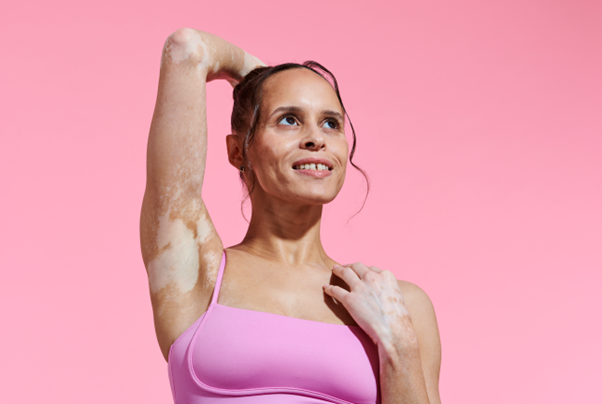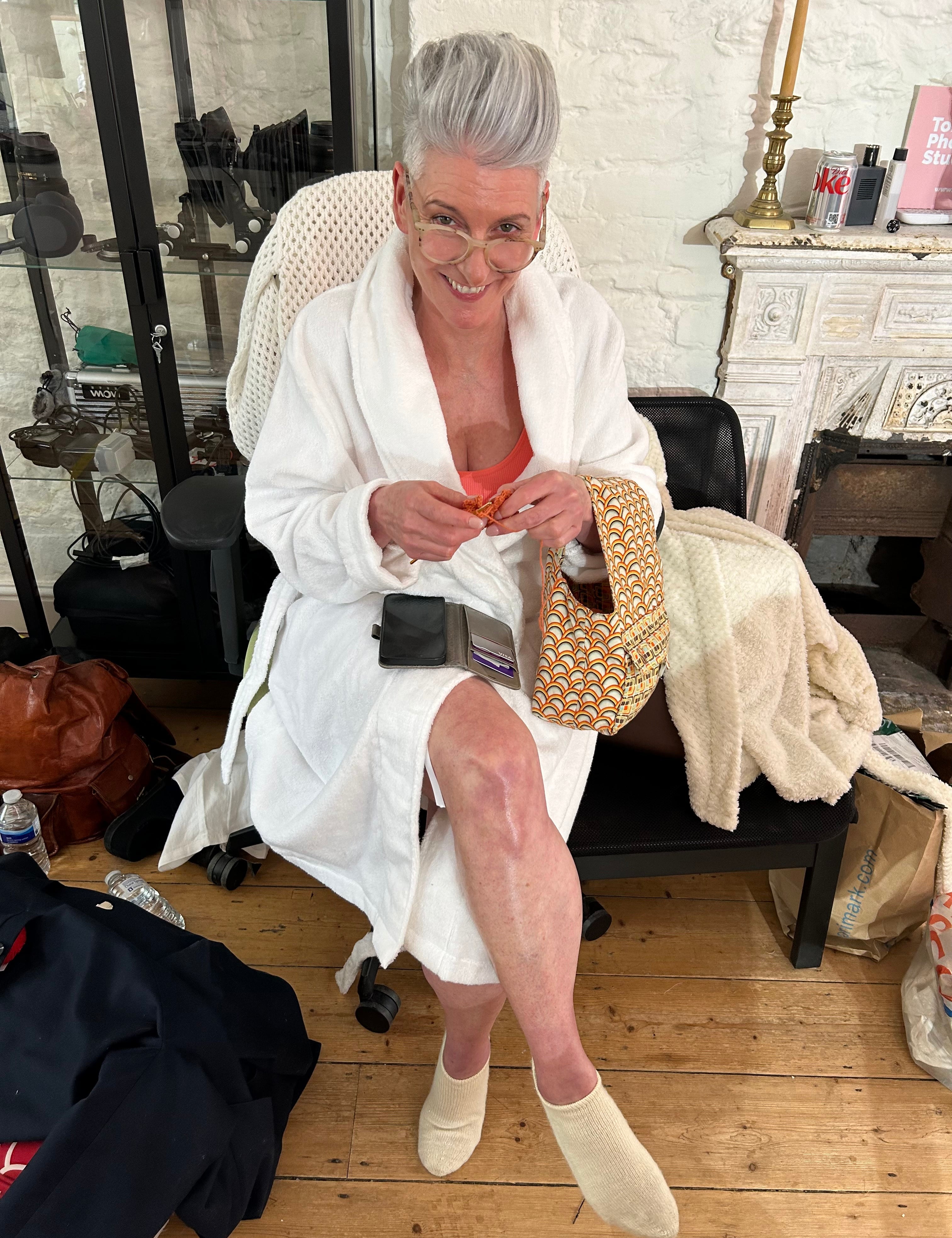Real Stories | Interview with Vitiligo Advocate, Natalie Ambersley

Real Stories | Interview with Vitiligo Advocate, Natalie Ambersley
In honour of World Vitiligo Day, we are excited to share our Real Stories interview with Vitiligo Advocate, Natalie Ambersley, an incredible woman living with vitiligo who is on a mission to transform struggle into strength and confidence. In our chat, Natalie gives us a glimpse into her daily life, and shares both the ups and downs of her journey. In this interview, She talks about how she’s learned to embrace her skin and beauty and stay confident despite the challenges she has faced as well as how she has become a vitiligo advocate.
- Can you tell us a little bit about yourself and your personal skin journey?
Hi, my name is Natalie and I have the skin condition vitiligo. Vitiligo is a condition where white patches form on the skin due to a lack of melanin. It can affect any one of any age, race or gender but most people develop the condition by the time they are 30 years old.
- Have you always had Vitiligo?
So, I developed my first patch when I was just three years old, and it later developed. Affecting my arms, my legs, parts of my body and my face. So, I had a relatively happy childhood because I didn't realise that I was different. I ran around in shorts and t-shirts with my skin on display, but I knew that something was different about my skin compared to all my friends.
The one thing that I remember most about my childhood is the many hospital appointments that I went on trying lots of different creams and different tablets because my parents were so desperate to find a cure, but nothing seemed to work.
- What are the most common misconceptions about Vitiligo?
So, some of the misconceptions about vitiligo is that it's contagious. This isn't true. You cannot catch vitiligo. It is triggered because it is an autoimmune condition.
Another misconception is that it only affects people with a darker skin tone. This isn't true, it can affect anyone of any skin tone. It's just more noticeable on someone with darker skin.
That it's just a cosmetic condition. This definitely isn't the case. Vitiligo is a psychologically damaging condition that can really impact a person's mental health and emotional well-being, so it is more than just a cosmetic condition because of the impact it can have on someone's life on a day-to-day basis.
- What are some of the biggest challenges you face living with Vitiligo?
My teenage years were my hardest years, and it was when I struggled the most. I became incredibly self-conscious and lacked self-esteem and confidence because I was very aware that I was different to all my friends. I struggled with swimming because I didn't want to show my skin in a swimsuit. Found sports really difficult and struggled during the summer because I couldn't wear shorts and t-shirts like all my friends. I battled with myself internally, constantly putting myself down and comparing myself to all the other girls in my school. Back then, mental health wasn't discussed, so I had to deal with my feelings behind closed doors with the support of close family members. I started to rely quite heavily on fake tan and camouflage makeup, which helped but didn't truly make me feel comfortable. I had a great set of supportive friends, but I simply couldn't get over the fact that I looked so different to them, which heavily impacted who I was.
- What makes you feel most confident and empowered in your own skin?
Things changed me in 2013 when I appeared on a UK news programme to talk about the challenges often associated with having vitiligo. I spoke about the feeling of being self-conscious, the social anxiety and the impact it had on my self-esteem. The response to the show was overwhelming. People started to reach out to say they too had the condition. Which was really comforting and made me realise that I wasn't alone.
Since then, I've become a vitiligo advocate, raising awareness and educating others about the importance of self-acceptance. My stories appeared in leading women's magazines. I've spoken on news programmes, and I speak at conferences about the importance of body acceptance and loving yourself for who you are. I'm now in a really positive place.
Over the years I've used a number of growth strategies that have helped me to accept my skin, and I've also become part of a wonderful vitiligo community. I'm proud of my skin. I'm proud of my story and I wouldn't change it for the world.
- What three things do you always keep on your nightstand?
So, the three things I keep on my nightstand are a really good nourishing hand balm, making sure that I use it just before bed, really locking in the moisture and sometimes also wearing a pair of gloves just so that I can really hold that moisture throughout the night as I'm sleeping.
The second thing is a really good lip balm again putting on lip balm nice and thickly so that it can work during the night.
And then thirdly, a really good pillow mist because I love the soothing and peaceful elements of a really good lavender pillow mist. So, I just spray it over my pillow and that helps me to drop off into a really lovely deep relaxing sleep.
- What is your go-to beauty hack or wellness ritual?
So, I have some wellness rituals that I absolutely swear by!
The first one is getting plenty of sleep because sleep is good for maintaining overall health and looking after your physical and mental health. The next one would be drinking plenty of water to flush out the toxins and keeping your skin as clear as possible. Investing in a really good moisturiser and making sure that you moisturise your skin, your face in particular day and night to keep your skin looking you. I do a lot of yoga. I love stretching, moving my body and just helping me to maintain physical and mental health and just keeping me as stimulated as possible. So, they are the wellness rituals I totally swear by.
- What advice would you give to your younger self?
So, I'll give my younger self three pieces of advice.
- The first piece of advice would be to not let your skin define who you are, and I think that's really, really important.
- The second piece of advice would be to remember all the incredible qualities that make up who you are as a person, such as being friendly, being authentic. Being honest, being open, being a really good listener and all those things that people love about who you are as a person.
- The third piece of advice I would give is to not let other people's opinions become a barrier to the life you want to live. We're here to enjoy life, to celebrate life, and I think it's really important that we put ourselves first and not let other people's opinions determine how we live our lives.
We hope you have enjoyed our interview with Vitiligo Advocate, Natalie Ambersley and felt as inspired by her real story as we did. Building skin confidence can be a journey but remember you’re never alone. Embrace your uniqueness and know that there’s a community here to support you. All skin deserves to be celebrated and cared for. Thank you, Natalie.
Follow Natalie on Instagram here @gifted_skin

